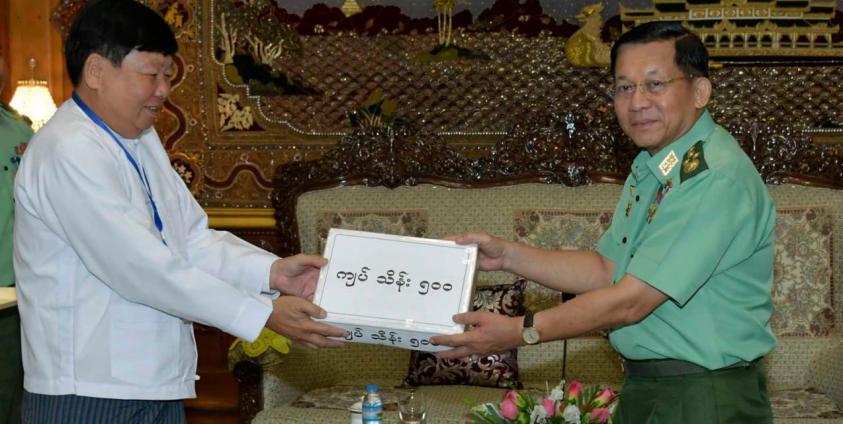Based on the Union Budget Law, emergency funds totaling 114 million Kyats have been approved for the 2023-24 financial year to support the 14 regions and states. However, the Military Council is requesting donations to assist those affected by the storm.
According to propaganda newspapers, the Military Council's troops, policemen, and departmental staff are working together with charity organizations to provide relief efforts. However, those who are directly involved on the ground state that there is no actual assistance being provided yet.
A person working on ground relief in Mrauk U Township said, "We are still awaiting any updates or information. No news has reached us regarding funding or assistance. In the meantime, we are actively engaged in providing support through charities, collaborating with other CSOs, and working alongside community members."
Three days have passed since the storm struck, but the Military Council has not yet disclosed the amount of the emergency fund that will be allocated to aid those affected by the storm.
On May 14, the Military Council announced in propaganda newspapers that individuals could donate money and materials to support the people affected by the natural disaster caused by Cyclone Mocha, which hit Sittwe Township in Rakhine State.
The National Disaster Management Committee, operating under the Military Council, has stated that donors have the opportunity to contribute monetary donations in kyats and US dollars. Additionally, materials can be donated directly to the governments of various regions and states.
According to newspaper reports, out of the total donation amount exceeding 130 billion kyats for aiding and rescuing those affected by the storm, the Military Council allocated only 70 billion kyats specifically for the reconstruction efforts in Rakhine State.
In relation to this situation, veteran politician U Pe Than highlighted the necessity of utilizing the designated special fund to address the extensive damage caused by the storm. He also emphasized the importance of ensuring transparency in handling both the donated funds and the state budget.
"The money we receive from donors is not enough. That's why it's important to also utilize special funds designated for natural disasters. In such situations, we have to make use of these funds. While donations are helpful, it's crucial for the government's special funds to provide assistance as well. This ensures transparency in how much will be effectively used and how much will come from the state budget, especially when there are many victims. If donor money is used as a budget, it can result in financial leaks and fraud for them."
According to the United Nations Office for the Coordination of Humanitarian Affairs (UNOCHA), the storm is expected to impact over 5.4 million individuals residing in Rakhine State and other areas of northwestern Myanmar along its path.
As per the law on natural disaster management, it is required to provide the affected people with adequate food, relief materials, and rehabilitation resources, and appropriate support must be provided from the approved fund.
Furthermore, the Military Council's Standing Order on Natural Disaster Management specifies that if the relevant ministries, Naypyidaw, regions, and states submit the required funds for rehabilitation, they must undergo verification and receive support accordingly.
A relief worker in Kyauktaw Township reported that, up to this point, the Natural Disaster Management Committee has not disbursed any funds for the individuals impacted by the storm. Instead, they have solely submitted a list of the damages incurred in the township.
"There will be over 3,000 houses, and that's just in one town. In Kyauktaw Township, numerous villages have suffered near-total destruction. The authorities have not yet provided assistance, despite their promises and even documenting the damage to buildings. There is a compilation of household lists, and they have pledged support, but as of now, there is no assistance being provided,” he said.
As per the lists published by the Military Council until the evening of May 15, the following damages were reported: over 11,500 residential houses, 73 religious buildings, 47 monasteries, more than 160 schools, 29 hospitals/clinics, 11 communication towers, 119 electricity poles, and 5 transformers across five regions and four states. Additionally, it is stated that 2 airports and 112 departmental buildings were destroyed.
The Military Council stated that the death toll included 21 local individuals, including security forces who were involved in the rescue operations. However, local news outlets based in Rakhine reported that over 400 refugees died in the Muslim relief camp located in Sittwe Township.
On the ground, the actual number of deaths could be higher than reported, and there are numerous individuals still missing. Therefore, search and rescue operations are actively underway. Ground rescue workers have stated that many areas in Rakhine state have sustained damage of up to 95 percent.
In recent days, the Military Council has officially declared 17 townships in Rakhine state as areas affected by natural disasters.







